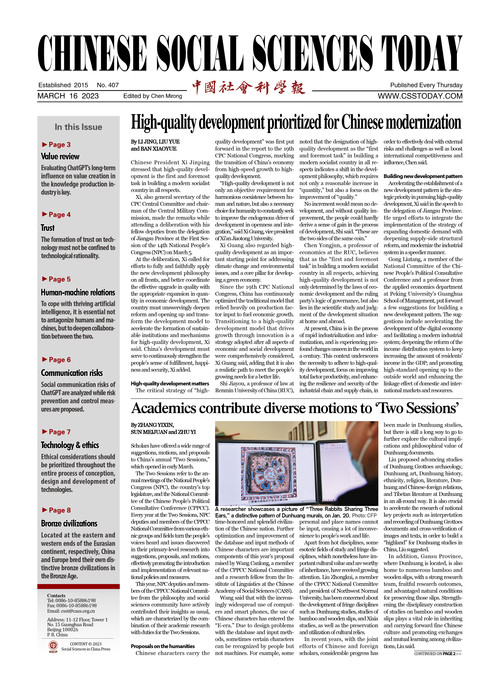Academics contribute diverse motions to ‘Two Sessions’
2023-03-16 14:12:41
A researcher showcases a picture of “Three Rabbits Sharing Three Ears,” a distinctive pattern of Dunhuang murals, on Jan. 20. Photo: CFP
By ZHANG YIXIN,
SUN MEIJUAN and ZHU YI
Scholars have offered a wide range of suggestions, motions, and proposals to China’s annual “Two Sessions,” which opened in early March.
The Two Sessions refer to the annual meetings of the National People’s Congress (NPC), the country’s top legislature, and the National Committee of the Chinese People’s Political Consultative Conference (CPPCC). Every year at the Two Sessions, NPC deputies and members of the CPPCC National Committee from various ethnic groups and fields turn the people’s voices heard and issues discovered in their primary-level research into suggestions, proposals, and motions, effectively promoting the introduction and implementation of relevant national policies and measures.
This year, NPC deputies and members of the CPPCC National Committee from the philosophy and social sciences community have actively contributed their insights as usual, which are characterized by the combination of their academic research with duties for the Two Sessions.
Proposals on the humanities
Chinese characters carry the time-honored and splendid civilization of the Chinese nation. Further optimization and improvement of the database and input methods of Chinese characters are important components of this year’s proposal raised by Wang Canlong, a member of the CPPCC National Committee and a research fellow from the Institute of Linguistics at the Chinese Academy of Social Sciences (CASS).
Wang said that with the increasingly widespread use of computers and smart phones, the use of Chinese characters has entered the “E-era.” Due to design problems with the database and input methods, sometimes certain characters can be recognized by people but not machines. For example, some personal and place names cannot be input, causing a lot of inconvenience to people’s work and life.
Apart from hot disciplines, some esoteric fields of study and fringe disciplines, which nonetheless have important cultural value and are worthy of inheritance, have received growing attention. Liu Zhongkui, a member of the CPPCC National Committee and president of Northwest Normal University, has been concerned about the development of fringe disciplines such as Dunhuang studies, studies of bamboo and wooden slips, and Xixia studies, as well as the preservation and utilization of cultural relics.
In recent years, with the joint efforts of Chinese and foreign scholars, considerable progress has been made in Dunhuang studies, but there is still a long way to go to further explore the cultural implications and philosophical value of Dunhuang documents.
Liu proposed advancing studies of Dunhuang Grottoes archaeology, Dunhuang art, Dunhuang history, ethnicity, religion, literature, Dunhuang and Chinese-foreign relations, and Tibetan literature at Dunhuang in an all-round way. It is also crucial to accelerate the research of national key projects such as interpretation and recording of Dunhuang Grottoes documents and cross-verification of images and texts, in order to build a “highland” for Dunhuang studies in China, Liu suggested.
In addition, Gansu Province, where Dunhuang is located, is also home to numerous bamboo and wooden slips, with a strong research team, fruitful research outcomes, and advantaged natural conditions for preserving those slips. Strengthening the disciplinary construction of studies on bamboo and wooden slips plays a vital role in inheriting and carrying forward fine Chinese culture and promoting exchanges and mutual learning among civilizations, Liu said.
Advising on fields of social sciences
Zhang Yuyan, a member of the CPPCC National Committee and director of the Institute of World Economics and Politics at CASS, has focused on how to better promote the healthy and stable development of China-EU economic and trade relations. Despite strengthened bilateral economic and trade ties in recent years, Zhang noted that the two sides also engage in competition in many fields.
To push the economic and trade cooperation between China and Europe to new levels, Zhang urged efforts to continuously consolidate bilateral economic and trade connections, expand investment areas, enrich investment forms, and develop China-EU economic and trade relations across the board.
On the new journey in the new era, how to accelerate and improve economic and social development is a matter of concern to Pan Yue, an NPC deputy and dean of the finance department of the School of Economics at Xiamen University. Pan pointed out long-standing problems such as uneven standards for discreditable behaviors across regions, and a mismatch between punishment and those undesirable behaviors, which have undermined the confidence of market entities to a certain extent. As such, it is necessary to further improve the social credit system to help unleash economic vitality, Pan said.



